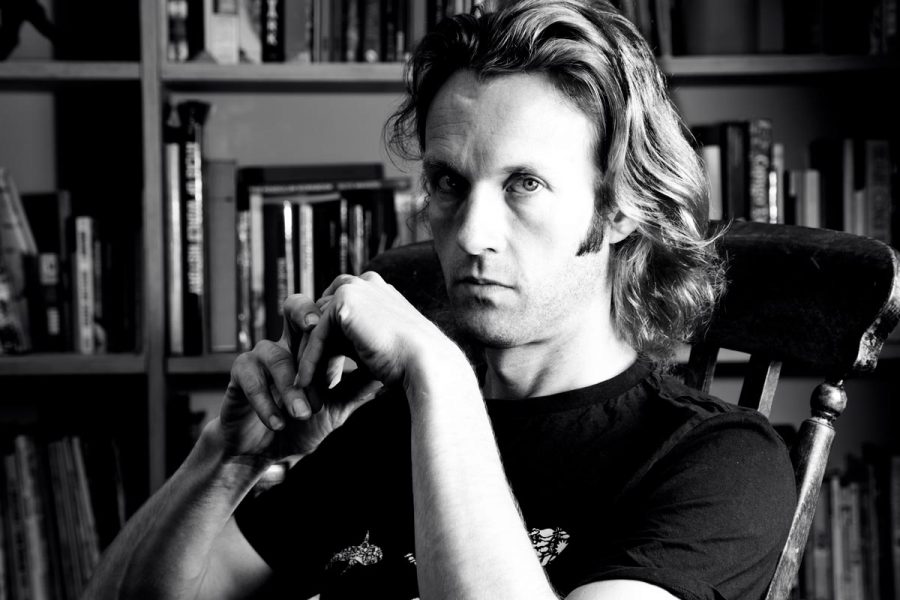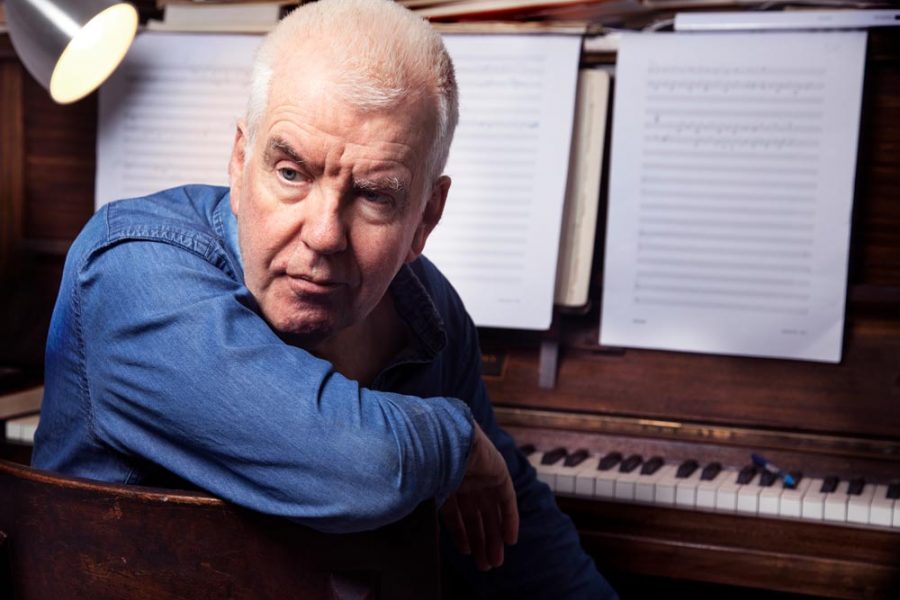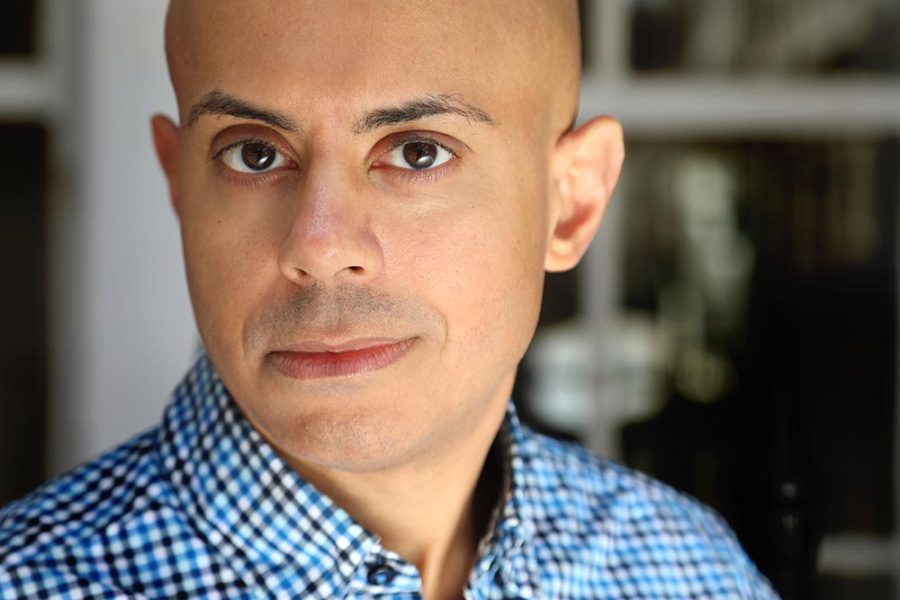Classical Crossover: Christopher Tin

September 2015
Words by
Emer Nestor
Photos by
Frances Marshall
Two-time Grammy-Award winning American composer Christopher Tin is currently making strides with his writing for contemporary classical music, film, video games, and commercials. His work is primarily classical with a world music influence.
After successfully completing his undergraduate education at Stanford University and Oxford University, he won a Fulbright Scholarship and completed a Masters in Composition for Screen at the Royal College of Music — graduating with distinction. Since then, Tin has racked up an impressive array of musical accolades from bodies such as the Game Audio Network Guild Awards, the John Lennon Songwriting Contest, the USA Songwriting Competition, the International Songwriting Competition (ISC), and GameSpy, to name but a few. He is a former recipient of the RCM’s Horovitz Composition Prize, and a Sundance Composer’s Fellowship. Tin’s albums have reached #1 on the Billboard charts. His songs have been sampled by rappers and covered by trance acts. Concert programs consisting entirely of Tin’s works have also appeared on the bill at Carnegie Hall. The young composer also enjoys collaborations with a wide variety of artists from electronic music pioneers, to opera legends, to international stars of world music.
We met with Tin at the recent iDIG festival in Dublin to talk about his musical influences, the world of games music, and his recent contribution to the song-cycle genre.
There were my core musical studies: composition, orchestration, conducting, theory...but it was a great environment for me to continue my musical scavenging as well."

Growing up in Palo Alto, California, did classical music have much significance in your childhood home?
Classical music was one of a variety of types of music played in my home. As a child I studied piano and trumpet, but in my spare time I was busy playing in jazz combos, forming garage rock bands with friends, singing in choirs, and writing for musical theatre. It was a big grab-bag of influences.
What are your fondest memories of your time studying at Stanford University?
My best memories of Stanford were probably all the musical activities I was involved with. There were my core musical studies: composition, orchestration, conducting, theory…but it was a great environment for me to continue my musical scavenging as well. I still continued playing jazz and conducting musical theatre, but I also stumbled into the expansive realm of world music. I directed a choir specializing in African gospel music, played in a traditional Japanese Taiko drumming ensemble. I even organized miniature WOMAD-style world music festivals with my colleagues in different world music disciplines. It was a wonderful time to be young and curious in an inter-genre sort of way.
Why did you decide to study composition and conducting at the Royal College of Music in London?
During my undergraduate studies I spent a semester as an exchange student at Magdalen College, Oxford, and subsequently developed a fondness for overseas study. I was taking private composition lessons with Melanie Daiken, Head of Composition at the Royal Academy of Music, and that’s when the idea of doing my postgraduate study in London came into my head. After doing a little bit of research, I discovered that the Royal College of Music had a great pedigree in composition and decided I wanted to be a part of it.
Who were your influences at this time?
My tastes mostly revolved around late-19th and early 20th-century, non-serial composers (Romantic and post-Romantic): Mahler, Copland, Stravinsky, Prokofiev, Debussy, Ravel, Gershwin and Bernstein…the list goes on. I was also very interested in film music as well: John Williams, Howard Shore, and the late James Horner in particular.
How did the success of ‘Baba Yetu’ affect your career, and why did you decide to get involved in composing for video games in the first place?
Composing for video games happened for me by accident. I was attending my Stanford five-year reunion and ran into my old Oxford overseas-studies roommate, Soren Johnson. We caught each other up on what we were doing: I was just getting deeper into my scoring career, having written a little bit of music for the movie, X2: X-Men United. Soren had just finished co-designing the game Civilization III. He asked me if I’d ever considered writing music for video games and before I knew it, I was in talks with the game company to write a new song for the opening titles of Civilization IV. That song was ‘Baba Yetu’ — a piece which channels all my disparate influences: African gospel, orchestral writing, and world percussion.
To date, ‘Baba Yetu’ has probably been the biggest moment in my career. There were, of course, the accolades (like the two Grammys), but that, and the album that it spawned (Calling All Dawns), launched me into a parallel career as both media composer and recording artist.
Would you like to contribute more to this ever-evolving genre?
I am very keen to continue working in games, and I often do. I’m juggling two large ones at the moment, as well as a couple of film scores, while also planning a spate of concerts in 2016 (including the Lincoln Center and Cadogan Hall, with the Royal Philharmonic Orchestra), and researching possible themes for my next album. But I do love games, both as a composer and a gamer, and am interested in finding ways to challenge myself musically through this medium.

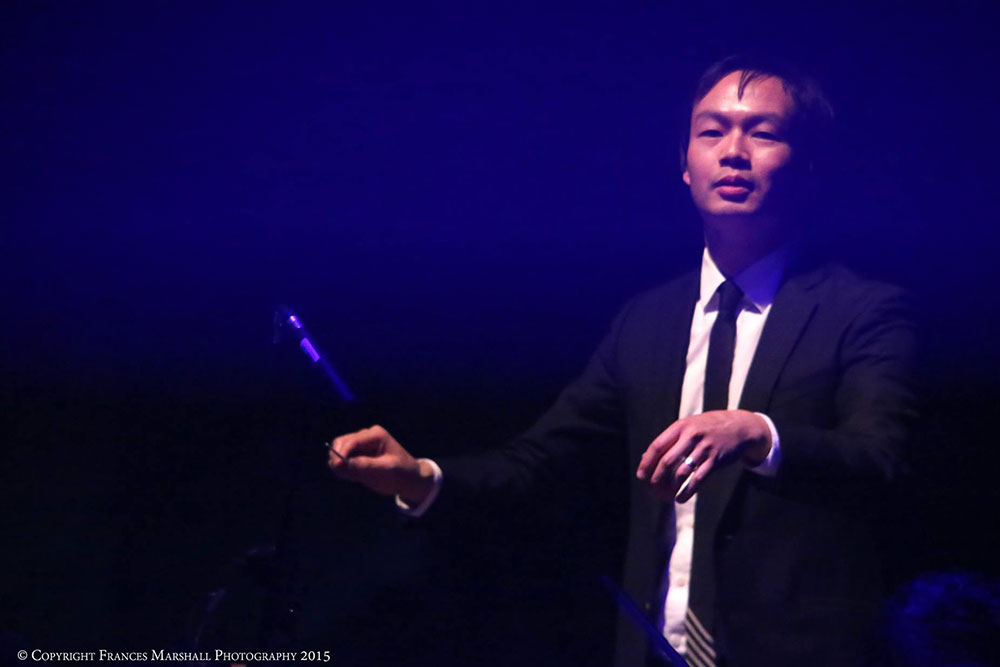


I think that versatility is very important as a personal skill in helping you hone your craft and develop your own voice..."

You co-created the startup sound for Microsoft’s Surface operating system and a demo song for Apple’s iconic Garage Band software — how did this opportunity come about?
Both were different processes, and both came in different ways. In the case of the Surface OS, I was working with a post-production house in Hollywood called Soundelux DMG and they paired me with a sound designer on making a bunch of operating system sounds for their nascent platform. In the case of Apple’s Garage Band, it happened early in my career. At the time I was assistant for the great composer and world-music producer, Michael Brook, and he had me take some of his guitar sketches and flush them out with orchestration and melodies. They’re both quirky line items on my resume.
Composers often find it difficult to have their voice heard in contemporary classical music — do you think it’s important to be versatile in your output?
I think that versatility is very important as a personal skill in helping you hone your craft and develop your own voice, as well as handle a wide variety of media-composing jobs; but the perception of versatility is strangely antithetical, in a way, to developing a career as a contemporary classical composer, or being any other sort of ‘artist’.
Let me unpack that statement a bit. Your own composition style will be the sum of all your own influences and the greater your palette and the larger your toolkit, the more you’ll be able to synthesize disparate influences into your own personal style. So in my case, I have a strong orchestral background, but also a world, jazz, and film music background (not to mention all the years of listening to 70s classic rock albums as an angsty teenager growing up in Northern California). These all get blended together in unexpected ways when I write music, and the output is (I hope) something somewhat unique and individual.
Likewise, as a film or game composer I’ll often be asked to write different styles of music. This was particularly acute when I was scoring a lot of commercials in my 20s — I would be asked, for the same ad campaign, to write anything from bossa nova, to funk, to hip-hop, to 60s Psychedelia…and the expectation is that you can do a reasonable facsimile of what any legitimate artist in that genre would be able to do. So having versatility was very important for that stage of my career.
However, when it comes to developing a brand as a composer — whether it be for media or the concert hall — what you actually want to be known for is one particular sound or style. Think about some of the most distinctive living composers — Thomas Ades, Eric Whitacre, Philip Glass, John Adams, John Williams, Hans Zimmer, Danny Elfman… — they all have a particular style that they write in, such that the moment you hear their music, you know it’s theirs. That’s what you want to cultivate as a composer — a particular stylistic voice that people associate with you. Then when you become an adjective, such as ‘Elfman-esque’ or ‘Glass-esque’, you know you’ve really arrived.
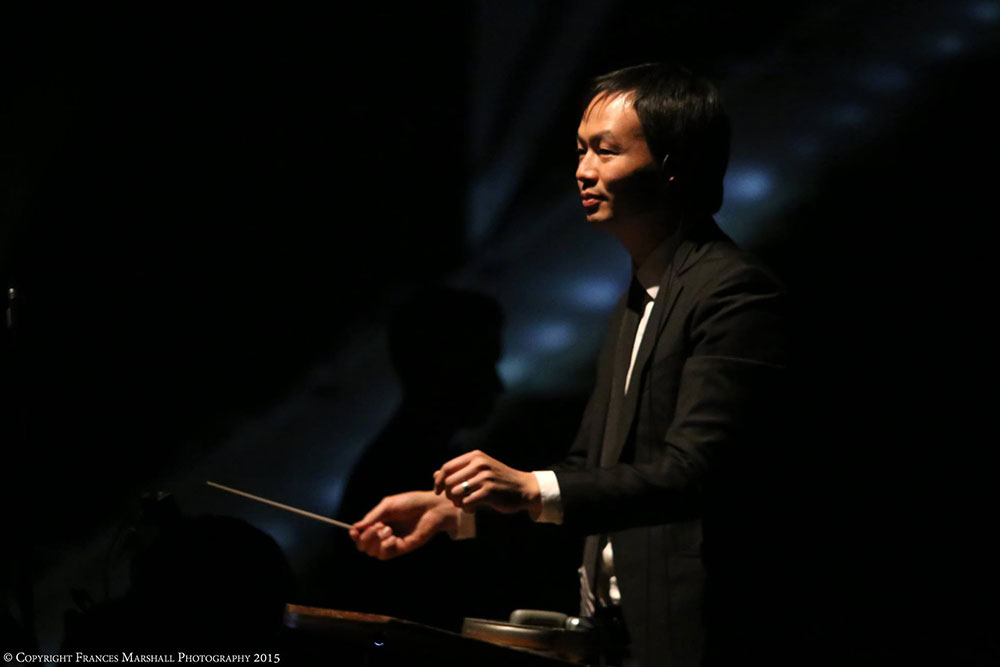


Do you see yourself as a classical composer with an interest in other mediums, or are you a ‘cross-over’ artist — how would you define your style?
I’m just a composer. Depending on who you ask, I’m different things to different people: a crossover composer, a classical composer, a video game composer…but since there isn’t a satisfying enough label that I can put on myself that encompasses the mixed bag of activities I’m involved in, I just use the broadest title possible and hope that someday we as a society can feel comfortable enough with stylistic ambiguities so that we don’t have to put everything into neat little sorting-bins.
As a conductor, what do you bring to the podium?
I try to convey the emotion of the music I conduct as much as possible, mostly through my facial expressions.
Calling All Dawns is a recent contribution to the song-cycle genre — what was the motivation behind such a work and how are ‘classical’ commentators reacting to such an eclectic musical venture?
The work was initially started as an extension of my song ‘Baba Yetu’, but with a more global reach. It’s received a great response from fans, but most of the core classical press doesn’t think it’s classical enough to devote much commentary…and I’m perfectly fine with that.
The synergy between different peoples, voices, and styles of music appears to narrate your own artistic aesthetic — can you elaborate on this?
I have a very eclectic set of influences myself and, as a result, much of my music is essentially cinematic and populist in nature. Many people also find various religious or spiritual meanings in my music; I myself don’t necessarily endorse any one particular reading, but am very pleased that a lot of people are moved in one way or another.
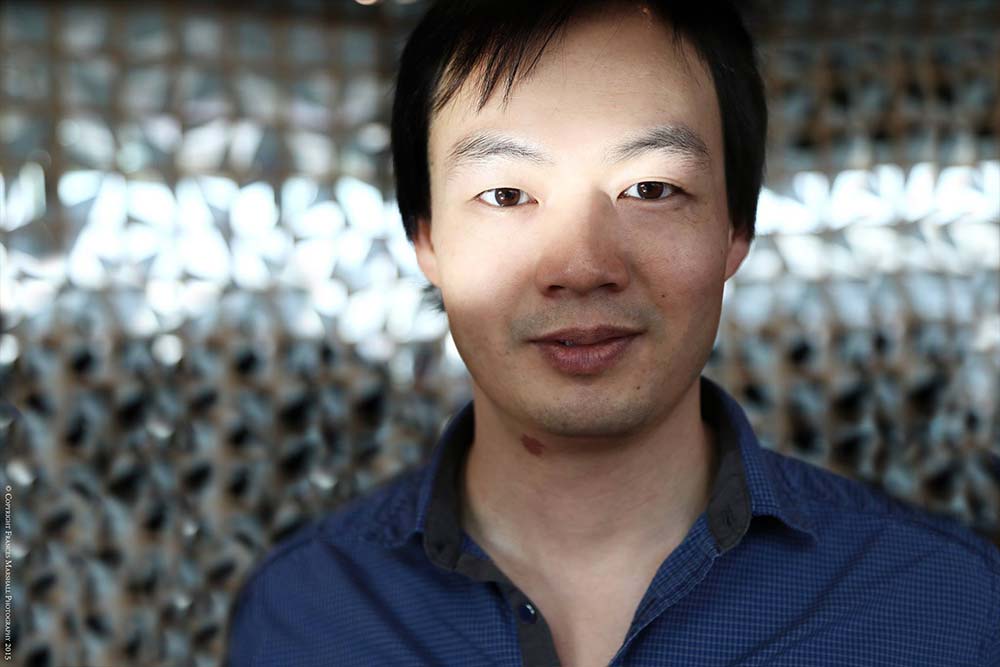

Do you have a particular writing system?
I try to vary my writing process as much as possible — alternating between improvising at the piano, to diving straight into notation, to going on long walks with my dog humming to myself. I think that your creative muscles are strongest when you challenge them in unpredictable ways, so I do my best not to lapse into routines.
What did you enjoy most about your time at the recent iDIG festival in Dublin?
Interacting with the fans! It gives the extrovert in me a jolt of energy.
What do you like to do for fun?
Well I can’t very well be an effective composer for games without devoting hours and hours of time to actually playing games, now can I? All kidding aside, I do enjoy video games, movies and TV like anyone else, but am also an avid hockey fan and play recreationally.
Having read English literature at university, do you still have a passion for books, and what are you reading at the moment?
I have less and less time for reading these days, but I’ve just started The Talent Code by Daniel Coyle. These days I tend to read more non-fiction. A lot of it is boring stuff…books on music copyright, articles about the friction between technology and the creative class, even instruction manuals for analog synth emulations…but occasionally I do read something for fun. Someday I’ll finish Remembrance of Things Past…someday….
Tell us about ‘Tin Works’.
‘Tin Works’ is my music publishing company and record label. My compositions and my recordings are my works, right? But if I’m in a extra “punny” mood, it’s also my motivational motto (“Tin works…hard!”), or what I think potential employers say to themselves when considering me for their projects (“Whom should we hire? I suppose Christopher Tin works”)…I’ll excuse myself from the conversation now!
What are you working on at the moment?
Two films, two video games, planning a concert tour and a Kickstarter for the next album. So there’s plenty on the plate!
For more information on the world of Christopher Tin see: www.christophertin.com
All images displayed in this article are subject to copyright.
Share this article


